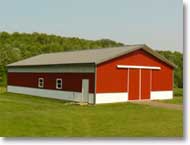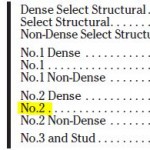In 2005, Hansen Pole Buildings supplied a new pole building kit to a client in Hernando, Mississippi. He opted not to construct his own building, instead hiring a builder who had constructed several of our buildings.
Recently, the client called to ask some questions about his building – specifically who the manufacturer of the steel roofing was. Upon further inquiry by the staff, it turns out he was asking questions because his roof has some leaks.
Digging deeper yet, I know exactly why…..
Back in 1980, I (along with my father-in-law and brother-in-law) constructed one of my first pole barns. The building was 24 feet square, with a single sloping roof. The high eave side was 14’ tall (and open), the low side 10’.
At the time, I was managing the roof truss manufacturing plant for Lucas Plywood and Lumber in Salem, Oregon. We’d begun selling pole barn kit packages, this particular building (in Hebo, Oregon) being one of them. I offered to drive the delivery truck on my own time, so we could use the crane during construction which worked out well for all involved.
Other than setting a one-day record for most rainfall ever in Tillamook county, everything was going without a hitch. As we had the boom truck, we framed the roof up on the ground and I had the other guys nail on the steel roofing (yes, back in the stone ages we used nails), while I readied the crane to pick up the roof and set it down on the columns.
The crane easily picked the roof up; we swung it into place and completed the building in the same day.
A not so good sidebar, the ground was a little spongy from the over ten inches of rain. When I lifted up the roof, the truck sank up to its axles and I had to pay a wrecker to pull me out.
About a week later, we got a call from the building owner – the roof was leaking. Like a sieve. Not good. Now remember, I had not supervised putting on the steel roofing, but I had checked the inside after the roof was up and didn’t recall finding a single “shiner” from a nail which missed a purlin.
Baffled, my father-in-law went over to fix the problem.
Nearly all steel roofing and siding currently used for modern construction is some variation of a “high rib” profile. The panels have a full under lap along one edge, and a ¾ lap on the other edge which goes over the full lap. Properly installed, the laps are weather tight.

However…..put the little lap down first, with the big lap over and I guarantee, it will leak. As it did on our Hebo building, as well as on our client’s building in Hernando.
In Hernando, the solution will be a bit easier than our case over three decades ago. Remove the screws near the laps, pull the overlap out from beneath the underlap and screw things back together. Lucky them….my father-in-law spent an entire day pulling out nails and replacing them, and there were only seven overlaps!
Memorize this: The BIG guy goes down first….big lap down, then small lap. No leaks.








